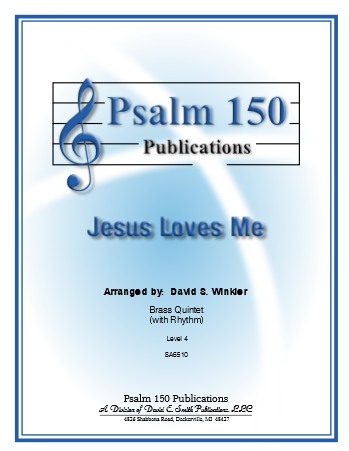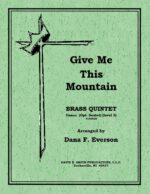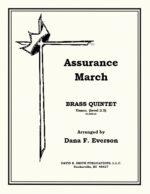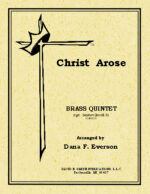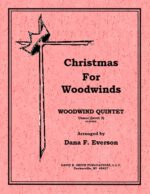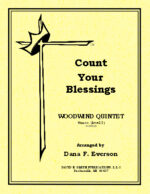| Instrument | |
|---|---|
| Level | 4 |
| Occasion | |
| Tune Name | |
| Theme | Jesus Loves Me |
| Writer | |
| Composer | |
| Publisher | |
| Copyright | 1984 |
Jesus Loves Me
$22.00
Related products
-
Give Me This Mountain
$12.00A standard brass quintet with optional trumpet for horn. As one might expect the piece is cheerful from beginning to end. It opens with rhythmic patterns where the first statement of the tune is presented by the trombone. The chorus is harmonically in block format where it comes to an end. NOW, something different the second trumpet and tuba present a simple accompaniment while all the other voice, yes voices, sing the words and melody of the song! A brief conclusion, a modulations and the piece returns to the texture of the earlier statement. The a bit of tongue and check statements and a very conclusive ending.
-
I Will Sing Of The Mercies
$9.00A woodwind quintet with opt. parts for Alto Sax and Bass Clar. This piece presents itself with a sense of joy throughout with the introduction itself in a motivic manner setting the tone The piece passes through several modulations where the upper voices carry the melodic material while the lower voices support the ensemble with strength. The writing of this arrangement is well crafted to take advantage of the “woodwind quintet sounds.” It continues that way right up to the very end with a declamatory statement of “Mercy.”
-
-
Assurance March
$9.00A traditional brass quintet with opt. trumpet for horn and extra baritone for use as a sextet. A piece in Alle Breve, is simply stated in block chords with an active bass line. The first strain, is repeated, and follows traditional march scoring. The second section is a bit slower and again in block chord structure, but this time with a first trumpet obbligato. With a regaining of tempo and style the piece becomes stronger until a grandiose ending.
-
Only A Sinner
$10.00A woodwind quartet for Flute, oboe, and two clarinets with optional parts for flute and alto sax. Plus a set of fifth parts for bassoon or bass clarinet can allow for the piece being a quintet. The first statement is in the clarinets where it leads into a full ensemble passing the lines amongst the parts. A delightful little segue leads to a modulation where the tune is in the lower lines alternated with flourishes in the flutes. This Alternating texture carries on for some time. Then the tempo picks up for a vibrant exclamation where the theme is once again bantered about where it makes one final boast and concludes.
-
Christ Arose
$12.00Scored for traditional brass quintet, an optional bartione part can be used to expand the piece to a sextet. After an opening upper brass fanfare, the lower parts present the theme in solemn fashion with further extended fanfares from the upper lines. The middle section reverses the stylistic assignments only to be given back to the opening styles. The with a powerful stacking of parts the piece concludes in a triumphant chord.
-
Christmas for WW
$9.00(std+ opt)(opt quartet) Joy To The World; God Rest Ye Merry Gentlmn; Angels We Have Heard On High; O Little Town Of Bethlehem
-
Count Your Blessings
$9.00Be ye thankful! Written for standard woodwind quintet with optional parts, this piece is highly decorated melodically and active rhythmically. It gives both the sense of majesty and joy.

